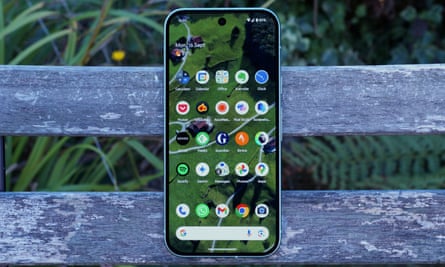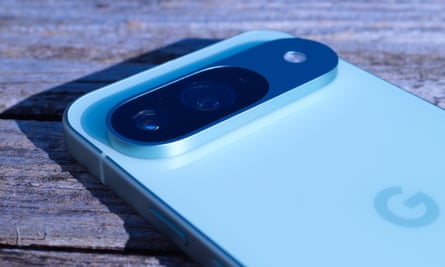Google’s cheapest Pixel 9 offers almost everything that makes its top-flight sibling one of the best smaller phones available, cutting a few key ingredients to price match Apple and Samsung.
The Guardian’s journalism is independent. We will earn a commission if you buy something through an affiliate link. Learn more.
The Pixel 9 costs £799 (€899/$799/A$1,349) shaving £200 off the asking price of the stellar Pixel 9 Pro while sitting above the excellent value sub-£500 Pixel 8a from May. That pits the new Pixel directly against Apple’s new iPhone 16 and Samsung’s Galaxy S24.
The Pixel 9 is identical in size and shape to the 9 Pro with matt aluminium sides and glass front and back. It has the same bold camera design on the back and a similar good-looking 6.3in OLED screen on the front. The display is not quite as sharp or bright as the 9 Pro, but the difference is minor.
Inside it has the same Tensor G4 chip with at least 128GB of storage, but less RAM with only 12GB not the 16GB of its more expensive sibling. In day-to-day usage the different is not noticeable and does not hold the Pixel 9 back in apps or AI for now.
The battery lasts about two days between charges, which is very good for a phone of this size. It fully charges in just over 80 minutes using a 27W or greater USB-C charger, though one is not included in the box.
Android 14 with most of Google’s AI

The Pixel ships with Android 14 and seven years of software support including an upgrade to Android 15 in the autumn, making it one of the longest-lasting phones on the market.
Like its pricier siblings, the Pixel 9 runs Google’s latest Gemini Nano AI models. It has Google’s new Screenshots app, which collects your caps and makes them searchable rather than cluttering up your gallery. The Pixel Studio app quickly generates images via text prompts with a range of styles and lets you edit them. Google’s most advanced AI editing features in Photos can automatically reframe an image using generative AI or “reimagine” it to fully recast a photo or insert objects using text prompts.
But unlike the Pixel 9 Pro phones, it does not come with a bundled year of Google’s £19 a month Gemini Advanced subscription that is required to access the impressive new Gemini Live fully conversational AI assistant experience. It still has free access to the standard Gemini assistant for text and one-way requests, and you can take out the subscription at extra cost, though it may not be worth it at the moment.
Specifications
-
Screen: 6.3in 120Hz FHD+ OLED (422ppi)
-
Processor: Google Tensor G4
-
RAM: 12GB
-
Storage: 128 or 256GB
-
Operating system: Android 14
-
Camera: 50MP + 48MP ultrawide, 10.5MP selfie
-
Connectivity: 5G, eSIM, wifi 7, UWB, NFC, Bluetooth 5.3 and GNSS
-
Water resistance: IP68 (1.5m for 30 minutes)
-
Dimensions: 152.8 x 72.0 x 8.5mm
-
Weight: 198g
Camera

The Pixel 9 has the same 50-megapixel main and 48MP ultrawide cameras as the Pixel 9 Pro, but lacks a telephoto zoom camera and some of the high-end features, including zoom enhance, full resolution capture and pro controls.
Photos from the main camera, in particular, are great across a range of lighting conditions. The ultrawide is pretty good too, and has a fun macrophotography feature for closeup shots. The main camera can zoom in on the sensor for a 2x magnification, but relies on digital zoom to go further, which can produce good results in bright light up to 8x. The 10.5MP selfie camera is a step down from the more powerful sensor on the 9 Pro, but still captures nice, detailed images.
The new Add Me feature inserts photographers into group shots by merging two photos taken back to back. An augmented reality overlay shows where the original photographer needs to position themselves to be added to the shot. It can trip up on certain objects in the scene, such as the occasional legs being blended into table tops, but can produce good images with a bit of practice.
The camera is still one of the best on a phone, but the lack of a telephoto camera really holds it back.
Sustainability

Google does not provide an expected lifespan for the battery but it should last in excess of 500 full charge cycles with at least 80% of its original capacity. The phone is repairable by Google and third-party shops, with published repair manuals and genuine replacement parts to be available from iFixit.
The Pixel 9 Pro is made with at least 20% recycled materials, including recycled aluminium, plastic, rare earth elements and tin. The company breaks down the phone’s environmental impact in its report. Google will recycle old devices free of charge.
Price
The Google Pixel 9 costs £799 (€899/$799/A$1,349).
For comparison, the Pixel 8a costs £419, Pixel 9 Pro costs £999, the Pixel 9 Pro XL costs £1,099, the Samsung Galaxy S24 costs £799 and the Apple iPhone 16 costs £799.
Verdict
The Pixel 9 is undoubtedly the best non-Pro flagship phone Google has made. It has a good balance of premium looks and features, shaving a bit off the cost of its top-tier phone of the same size.
The problem is that without a telephoto camera and the best AI features, which are limited to the more expensive 9 Pro series, the standard Pixel 9 is just a bit too close to the much better value Pixel 8a in features and capabilities.
That leaves it in a difficult spot. If the £999 Pixel 9 Pro blows the budget, then £800 for the Pixel 9 is still a lot to spend when you can get 80% of the experience for just over half the cost with a £419 Pixel 8a.
The Pixel 9 is therefore a good phone that is overshadowed by better Google phones at both ends of the spectrum. I would wait for a sale to make the price more tempting.
Pros: seven years of software updates, great camera, good screen, good battery life, good size, recycled aluminium, impressive local and generative AI features, fast fingerprint and face recognition.
Cons: no zoom camera, face unlock option not as secure as Face ID, raw performance short of best-in-class, not good enough value.

